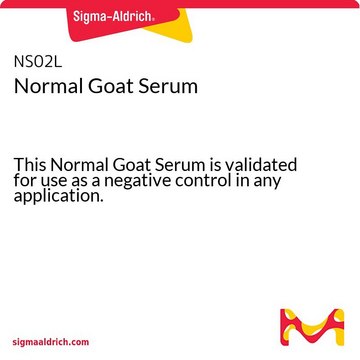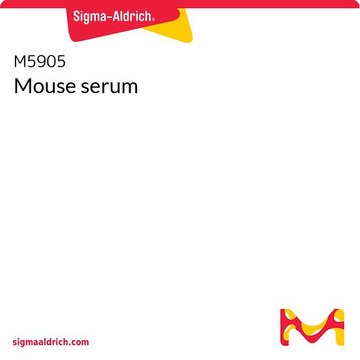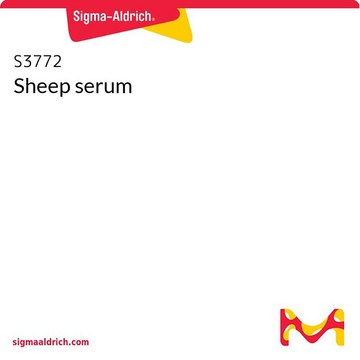Recommended Products
biological source
donkey
Quality Level
sterility
non-sterile
contains
preservative
application(s)
research pathology
shipped in
dry ice
storage temp.
−20°C
Looking for similar products? Visit Product Comparison Guide
General description
Donkey serum is pooled from a normal donor herd. In immunoassays, normal donkey serum can serve as a blocking agent and a control. It is used as a blocking agent in various studies for immunohistochemistry and immunocytochemistry, ranging from 5% to 20%.
Application
Donkey serum has been used:
- as a component in blocking buffer for immunofluorescence
- in phosphate buffer saline (PBS) as a blocking agent
- as a blocking agent in frozen immunocytochemistry and immunohistochemistry
- to prevent nonspecific binding in parvalbumin immunohistochemistry
Disclaimer
Unless otherwise stated in our catalog or other company documentation accompanying the product(s), our products are intended for research use only and are not to be used for any other purpose, which includes but is not limited to, unauthorized commercial uses, in vitro diagnostic uses, ex vivo or in vivo therapeutic uses or any type of consumption or application to humans or animals.
Related product
Product No.
Description
Pricing
signalword
Warning
hcodes
Hazard Classifications
Aquatic Chronic 2 - Eye Irrit. 2 - Skin Irrit. 2 - Skin Sens. 1
Storage Class
12 - Non Combustible Liquids
wgk_germany
WGK 3
flash_point_f
Not applicable
flash_point_c
Not applicable
Certificates of Analysis (COA)
Search for Certificates of Analysis (COA) by entering the products Lot/Batch Number. Lot and Batch Numbers can be found on a product’s label following the words ‘Lot’ or ‘Batch’.
Already Own This Product?
Find documentation for the products that you have recently purchased in the Document Library.
Customers Also Viewed
Yasmin Fardghassemi et al.
Disease models & mechanisms, 10(12), 1465-1480 (2017-10-25)
Polyglutamine expansion diseases are a group of hereditary neurodegenerative disorders that develop when a CAG repeat in the causative genes is unstably expanded above a certain threshold. The expansion of trinucleotide CAG repeats causes hereditary adult-onset neurodegenerative disorders, such as
Helen F Irving-Rodgers et al.
Biology of reproduction, 69(6), 2022-2028 (2003-08-22)
Bovine ovarian antral follicles exhibit either one or the other of two patterns of granulosa cell death in atresia. Death can commence either from the antrum and progress toward the basal lamina (antral atresia) or the converse (basal atresia). In
H F Irving-Rodgers et al.
Molecular reproduction and development, 73(10), 1292-1302 (2006-07-26)
Using immunohistochemistry and RNA analyses we examined the fate of components of a newly identified matrix that develops between granulosa cells (focimatrix, abbreviated from focal intraepithelial matrix) and of the follicular basal lamina in ovulating bovine ovarian follicles. Pre- and
Omid Ahmadi et al.
Journal of gastroenterology and hepatology, 25(2), 277-285 (2009-10-02)
Interstitial cells of Cajal (ICC) are distributed with smooth muscle throughout the gastrointestinal tract and are involved in regulating motility. ICC were recently discovered in the wall of the human gallbladder. This study sought to determine whether ICC are present
Marianne O Larsen et al.
American journal of physiology. Endocrinology and metabolism, 282(6), E1342-E1351 (2002-05-15)
Nonrodent models of diabetes are needed for practical and physiological reasons. Induction of mild insulin-deficient diabetes was investigated in male Göttingen minipigs by use of streptozotocin (STZ) alone (75, 100, and 125 mg/kg) or 125 mg/kg combined with pretreatment with
Our team of scientists has experience in all areas of research including Life Science, Material Science, Chemical Synthesis, Chromatography, Analytical and many others.
Contact Technical Service

















